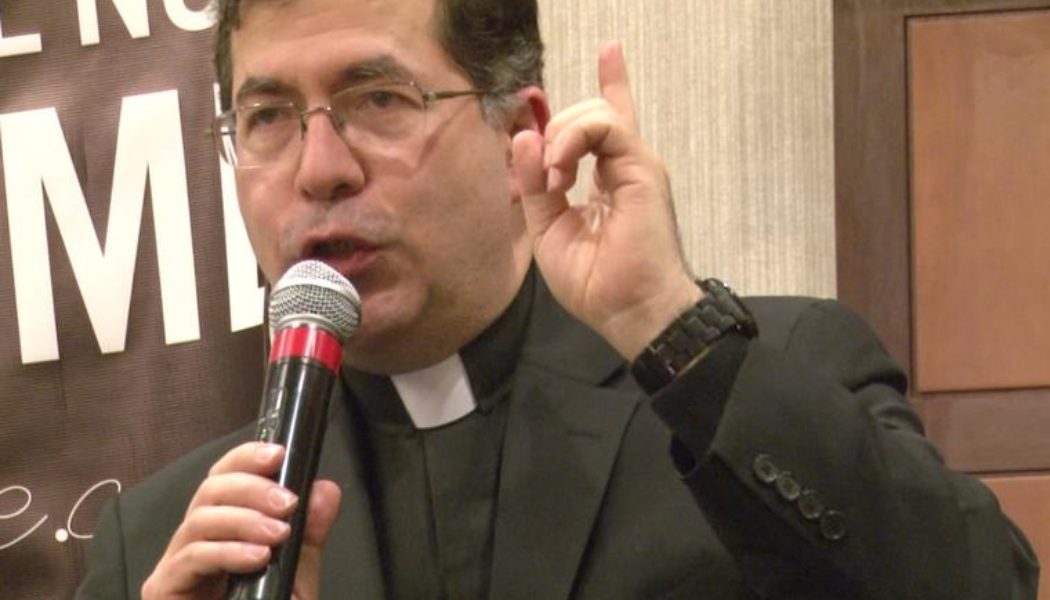
The year ended with a double helping of distressing news.
Just as Catholics were reeling from the news of the “gruesome” abuse by Jesuit Father Marko Rupnik, compounded by appalling oversight by the highest levels of the Society of Jesus, the earthquake of Father Frank Pavone’s laicization hit.
Pavone, head of Priests for Life, was dismissed from the clerical state apparently at the request of Bishop Patrick Zurek of Amarillo, Texas. The dismissal was approved by Pope Francis, meaning that no appeal is possible.
Pavone himself asked, “What took so long?” in response to the news, as Bishop Zurek has been trying to laicize him for more than five years for contumacious disobedience. Pavone desired to devote himself to full-time work for Priests for Life, a secular corporation, based in Orlando, Florida, where he lives, rather than work in the Diocese of Amarillo on an assignment from Bishop Zurek. The bishop and priest could not, over many years, make an arrangement, and so Bishop Zurek sought, and obtained, Pavone’s dismissal.
Given that permanent dismissal is the most serious penalty a priest can face — excommunications, in comparison, are intended to be lifted after repentance is made — Catholics are asking why Pavone was given such a severe penalty, especially when other malefactors are not dismissed from the priesthood.
Disobedience, Not Pro-Life Work
Pavone has claimed repeatedly that his dismissal is the result of “some bishops” attempting to suppress his pro-life work and that his case is an example of persecution of the pro-life cause in the Church.
The official statement from the Dicastery for the Clergy mentioned “blasphemous communications on social media” and “persistent disobedience of the lawful instructions of his diocesan bishop” as the reasons for Pavone’s dismissal, noting that he was given many opportunities to defend himself. It appears that, at some point, Pavone ceased to participate in the process against him altogether — hence his claim that he only learned of his dismissal when contacted by Catholic News Agency.
The blasphemy charge can be set aside as a distraction. Priests are not dismissed for taking the Lord’s name in vain on Twitter, however unbecoming that might be. Disobedience to his bishop is the reason for Pavone’s dismissal.
Highly credible pro-life Catholics, while lamenting the sorry end to this saga, have clarified that this is about disobedience, not pro-life work. Kathryn Jean Lopez has said flatly that this “is not about abortion” but rather about Pavone — despite the good that he has done — going “rogue.”
Phil Lawler wrote that Pavone’s dismissal was actually “overdue,” despite the pain it will cause Catholics who think a double standard is being applied — liberal malefactors get a pass; conservatives get the boot. Lawler writes:
“Yes, there are other priests — many others, really — whose conduct has been far more egregious, whose public statements have been far more injurious to the faith. Yes, it is painful to see a leading figure in the American pro-life movement disciplined, while others who undermine Church moral teaching are showered with Vatican honors. Yes, many thousands of loyal Catholics have lost confidence in their bishops, and they see a blatant double standard in the handling of disciplinary cases. Nevertheless the laicization of Frank Pavone is not an injustice. In fact it should not be a surprise.”
Why Disobedience Is So Grave
At a time when Roman leadership seems determined to drag the Church back to the 1970s, the Pavone case revives memories from that period.
Why was Archbishop Marcel Lefebvre and his Society of St. Pius X sanctioned for his “traditional” stand, but “progressive” abuse of the most spectacular kind was not? The wounds from that experience took a long time to heal — and are still bleeding in some quarters — and the Pavone case will open new ones.
The key is to understand the relationship between obedience and communion. The Church is able to cope with sin, even grave sin; in a sense, that is what she exists for. There is the ministry of mercy. The instruments of justice — penalties, sanctions, canonical measures — are aimed at repentance and conversion.
Persistent disobedience and defiance of superiors, though, is a different matter. It threatens the very communion that is the life of the Church. “Going rogue,” as Lopez put it, means being, in a sense, alone or part of a faction. The Church is not a faction, much less a partisan actor.
The Church is not only a human society, but a communion founded by Christ on apostolic foundations. The Church exists to extend mercy to sinners. Grave disobedience threatens the existence of the Church. Hence acts that threaten that communion merit severe penalties. That is why Archbishop Lefebvre was excommunicated for ordaining bishops without permission from the Holy See. It ruptured communion. His disobedience, after being specifically instructed not to proceed, threatened the unity of his flock with the communion of the Church.
Father Rupnik and Pavone
I would find it hard to be in the same room with Father Marko Rupnik, given the apparent moral monster that he is. That such a monster would be permitted by the Jesuit father general to preach to his fellow Jesuits, Pope Francis and Cardinal Luis Ladaria and the rest of the prelates of the Roman Curia, is frankly obscene.
And yet, Father Rupnik, should he be repentant and willing to do penance for his sins and crimes, has a place not only in the Church but also in the priesthood, albeit without ministry, in a quiet life of prayer and penance. It would be difficult to exact justice and extend mercy, but it can be done.
As to Pavone, I would have no trouble being in a room with him, even though we have never met. I admire much he has done for the pro-life cause, though demurring from his excesses. Nevertheless, a “rogue” priest is a contradiction in terms. His dismissal is an outcome of his own making, even “overdue,” in Lawler’s judgment.
Pastoral Failure
But the dismissal was not only of his own making. Bishops can abuse their authority, too, and the necessity of authority in any society — a symphony, a football team, a police force — does not mean that it is exercised well. Indeed, Pope Francis has repeatedly called attention to “abuse of power” and “abuse of office” as serious temptations for clerics.
Pavone’s case — a priest at persistent loggerheads with his own superior — is not at all common, but neither is it vanishingly rare. With even minimal goodwill, pastors find a way to work through it.
Consider 2002, when the Jesuit superiors in San Francisco exiled Father Joseph Fessio to a remote nursing home in order to punish him for stubbornly — and effectively — refusing to go along with the doctrinal error and moral corruption promoted by the Jesuits there. It was a gross abuse of power.
Father Fessio had powerful friends. Cardinal Joseph Ratzinger made it clear to the father general in Rome that such punitive persecution could not stand. Yet not even Cardinal Ratzinger could restore Father Fessio to his position in California; he was permitted instead to take up a position at Ave Maria University in Florida. The perfidy of the Jesuits in California was not completely reversed. But a way out was found.
Father Fessio’s conduct — he went obediently — is not like that of Pavone, but the example demonstrates that solutions can be found.
The Zuhlsdorf Solution
Consider the case of Father John Zuhlsdorf. “Fr. Z,” as he is known, is an American priest who was ordained for the Italian Diocese of Velletri-Segni (one of the ancient “suburbicarian” dioceses near Rome). After service in the Roman Curia, Fr. Z returned to the United States. For a time, he had faculties in the Diocese of Madison, Wisconsin, and headed up the local Latin Mass Society. He is best known for his enormously popular blog.
In late 2020 and early 2021, Fr. Z was carrying out exorcisms online against the pandemic — for which he had the bishop of Madison’s permission — and in relation to claims of election fraud in the 2020 presidential election. The latter had not been authorized by the bishop, and he took a dim view of that. It was mutually decided that Fr. Z would depart Madison, and he was thanked for his good service there. He remains in good standing as a priest of Velletri-Segni, though Bishop Vincenzo Apicella, who served as the diocese’s bishop until he retired in May, made mildly disparaging remarks about Fr. Z’s blog and gave no assignment to Father Zuhlsdorf.
Fr. Z is a priest who does not minister in his own diocese, has not done so for most of his priesthood, does not live there and did not have an assignment from Bishop Apicella, who took no practical responsibility for his oversight. After departing Madison, it is not clear if Father Zuhlsdorf has affiliated with any other American diocese, though he still lives in the United States.
Is any of this ideal? Is it what the Church envisions the relationship between bishop and priest to be? Clearly not. But it prevails, and it appeared to be agreeable to both Fr. Z and Bishop Apicella. Father Zuhlsdorf was not disobedient, and Bishop Apicella was indulgent. There is a certain Churchmanship in that. The Church is rather well-experienced in muddling through with such arrangements.
Could not have something been worked out with Pavone? Cardinal Francis Arinze is the titular bishop of Velletri-Segni. Was there no one in the Roman Curia to ask Cardinal Arinze to use his good offices with Bishop Stefano Russi, Bishop Apicella’s successor, to add Pavone to his diocese’s roster of non-resident, non-assigned Americans? It is hard to believe that there was nowhere to be found a bishop to take Pavone in.
The pastoral failure, for which Pavone must take the lion’s share of the blame, is that a solution could not be found. And now the Church suffers. Pavone has lost his priestly ministry, and the credibility of bishops takes another blow. It should have been avoided.
Join Our Telegram Group : Salvation & Prosperity









